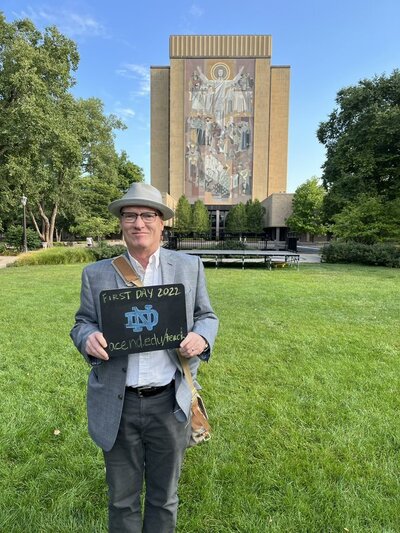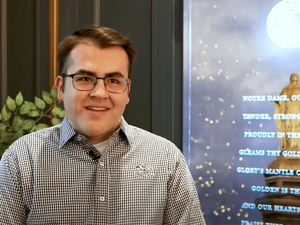Daniel Lapsley, Notre Dame professor of psychology, used the word "naive" to describe himself as a high school student approaching his college years. He grew up with five siblings near Pittsburgh. His father was a steel worker and his mother was a homemaker. Neither of Lapsley’s parents had been to college, but he wanted to go.
Lapsley also knew he wanted to study psychology; his interest in the field began in seventh grade when he read a biography of Sigmund Freud. He became fascinated and, when it came time to research colleges, Lapsley looked through a list of colleges to find one where he could major in psychology.
“I was so naive, I didn’t know that I could probably be a psychology major anywhere,” he said with a laugh. “I also didn’t know that I was supposed to apply to a lot of schools – and then visit them!” Lapsley ended up choosing Indiana University of Pennsylvania, which was about 60 miles away from his home.
“It seemed really big to me,” he said, “but I really relished my time there. I think I got a good education.”
His experience there set him up for success in the field of psychology.

Since earning a Ph.D., his teaching and research career has taken him from Notre Dame to Ball State University to Brandon University in Canada, and back to Notre Dame, where in 2006 he joined the psychology department and began teaching in the Alliance for Catholic Education (ACE) program.
His research in adolescent social cognitive and personality development includes examining adolescent invulnerability and risk behavior, narcissism, separation-individuation, self, ego and identity development, and college adjustment.
He also studies the moral dimensions of personality and other topics in moral psychology, and has written on moral identity and moral and character education.
Lapsley is a proud member of the Building Bridges Mentoring Program on campus which connects students of color with faculty in departments they wish to explore academically.
The initiative, he said, is indicative of the kinds of resources Notre Dame strives to provide for students of color and first-generation students.
“There’s an intentional effort,” he said, “to connect students to faculty, to staff, and with the people who make up their residence halls.”
Students may be intimidated at the prospect of reaching out to faculty themselves but, Lapsley assured, “faculty are available and looking for them to do that.”
He said it’s a “distinctive mark of excellence here at Notre Dame” that faculty take such an interest in students, not just on the academic side of things, but with regard to students’ well-being.
Lapsley's advice to other first-generation students is to explore all their options and find a place that both meets their needs and feels right.
“Look to a range of schools and find out if they're going to have your major. And find a school where you feel at home — that it could be a small private school, it could be a state university. I think a lot of things work into that decision about where to apply — you know, family finances, availability of aid, and other things,” he said.
Watch the video to learn more about Lapsley and the Notre Dame experience.
See More FirstGen@ND

Check out previous FirstGen@ND videos and stories:
- FirstGen@ND: Erik Finch-Soto ’25 Majors in Neuroscience, Finds Community
- FirstGen@ND: Karyme Grosso '23, Design Major, Resident Advisor, and Ballet Folklórico Dancer
- FirstGen@ND: Notre Dame Parent Esther Chavez
Originally published by at admissions.nd.edu on February 14, 2023.


